Entries tagged as ccc
23c3 berlin compiz drm dvb freesoftware jugendumweltbewegung jukss königswusterhausen ökologie science theory tpm wiki 24c3 kongress 4k aiglx assembler breakpoint demoscene entropia gpn gpn5 hacker linux programming win32 xgl 3d cacert ccwn come2linux cryptography darmstadt essen games gentoo gentoo. compiz hash md5 metacity mrmcd mrmcd100b mrmcd101b passwörter security server sha1 unicode utf-8 vortrag wiesbaden wine xorg 129a 1mai 27c3 a100 abgeordnetenhaus akongress akw allianz almaty anarchiekongress antiatom asia asia2013 atheismus atomkraft autobahn bahnhof belene bild brandenburg bundestagunited bus buskampagne bz cellular china copyright creativecommons dataretention datenschutz demonstration dose elephantsdream energie energietisch energiewende erlian freeculture freedomnotfear freifunk freiheitstattangst frequencies frequency fsfe gott gsm informationsfreiheit itu journey kamera kameraüberwachung kazakhstan kernkraft klima klimaschutz klimawandel kohle kohlekraft kyoto lessig mcplanet mobilephones moleculeman moscow musik ökostrom openbsc openbts openstreetmap osm osmocombb papst peterschaar petropavl piratenpartei poland polizeigewalt preise privacy privatsphäre ratzinger re-publica re-publica09 religion rp09 rwe sony springer strom stromnetz tagebaue taz thermen topberlin train transsiberian travel travelling treptow tuberlin überwachung ubuntu umwelt umweltschutz unserwasser urgewald verkehr videoüberwachung volksbegehren vorratsdatenspeicherung wahl warsaw wasser wg windowsxp wiretapping wirklimaretter wos wos4 yining youtube zensur zimmer bewußtsein philosophie braunschweig bsideshn cdu easterhegg encryption gerthoffmann hannover internetausdrucker netzpolitik pgp talk tls c4 cctv gpn7 surveillance überwachungskameras ca certificate certificateauthority https openssl privatekey rsa sha2 sha256 ssl symantec transvalid x509 algorithm android browser cccamp11 cloudflare dell edellroot eff facebook maninthemiddle observatory openleaks pss superfish updates vulnerability augsburg beryl compizfusion composite inkscape kde lit07 lug luga waiblingen 68 aacs abmahnung alecempire aliens amusementpark art banksy barrierefrei beijing berneconvention bittorrent bitv blueray boluo brigittezypries buch bücher bundestag cedric chaosradio cinderella copycat corruptibles cpdl culturalflatrate culture di disney disneyland ebook epetition eu eucopyrightdirective evrimsen fake fanart fanfiction filesharing film freizeitpark funkerspuk gema gemavermutung geodaten graffiti guangzhou gutenberg gvl hallstatt hddvd hiddenfrontier html huizhou ifpi illegalart iromance jankroemer journalismus justizministerium kinderlieder kopierschutz kriegderwelten kts kultur laterne laternenumzug licenses luoyang markenrecht metis movies mpaa musikindustrie musikpiraten mysmartgrid negativland netradio nocopy patent patente penguinbooks petition piratbyrån piratebay politik presse pressefreiheit publicdomain radio radiopolitik raubdruck raubkopie remix rsaoaep rsapss sanktmartin savenetradio sciencefiction shijingshan spiritlevel startrek stepmania tagesschau thepiratebay tomcruise trip2011 trips tuxmas tuxmas07 usa usbstick verwertungsgesellschaft vgmusikeditionen vgwort vlc w3c warez webradio wipo wizo apache apt badkeys cccamp cccamp15 certificates chrome chromium cmi crash crypto deb debian deolalikar diffiehellman diploma diplomarbeit email english enigma fedora fortigate fortinet forwardsecrecy gnupg gpg gsoc http itsecurity javascript key keyexchange keyserver leak letsencrypt libressl math milleniumproblems mitm modulobias nginx nist nss ocsp ocspstapling openbsd openid openidconnect openpgp packagemanagement papierlos password pnp provablesecurity random rc2 revocation revoke rpm schlüssel sha512 signatures slides smime sso stuttgart thesis university verschlüsselung web websecurity wordpress adresse agb antigenozidbewegung aok ard bahn bundesverfassungsgericht bürgerrechte bverfg datamining datensparsamkeit db diy einkaufen fernsehen frankfurt fricard gez hausdurchsuchung humanistischeunion ice innenpolitik jugendschutz justiz karlsruhe köln microsoft mobil ninahagen optoutday ör rechtsbeugung reklame rfid richtervorbehalt schäuble spam steuerid steuernummer uni verfassungsgericht verschwörungstheorien web20 webmontag werbung wga zdf zigaretten zigarettenautomaten backnang macos vista windows aead aes berserk bleichenbacher cfb cms firefox gajim jabber joomla otr owncloud poodle rss sni update xmpp geo gpn6 gps programmieren querfunk wahlcomputer wahlmaschinen 3ddrucker adobe ati base64 bash bios blob bonn bufferoverflow camera canon chdk chemnitz cinelerra clt code codecs compression console csrf css cve ddwrt desktop developingworld digitalcamera driver dvd eltorito evince exe ffmpeg firmware france freewvs freiegesellschaft froscon froscon2007 fsf gaia gargoyle ghost gimp glibc gnome google googleearth graphics grub hardware heartbleed homebrew ibm ico icons icoutils iso ixus kpdf laptop lenovo license lpi lpic lspci lsusb memdisk messe movie nancy nessus nouveau nvidia okular olpc openexpo opengl opensourceexpo openvas pciids pdf phoronix php poppler rapidprototyping rar realmedia realvideo redhat reprap retrogames reverseengineering rmll router rv30 rv40 s9y script serendipity sfd shellshock siegburg simcity society softwarefreedomday sqlinjection sumatrapdf sunras syslinux thesource theunarchiver thinkpad unar usbids video videoediting wii wiibrew windowsrefund wrestool xss computer cybercrimeconvention gesetze hacktools passwort wiesbadenerkurier adguard antivirus breach cookies crime freak heist kaspersky komodia netfiltersdk privdog protocolfilters samesite time esoterik ngm scientology sekten universellesleben vogelgrippe grenzendeswachstums peakoil wachstum wachstumskritik agenda21 barcamp blog bnn bodensee co2 computerspiele ejc enbw gamer garmin geocaching informationdisclosure jonglieren killerspiele kohlekraftwerk kubik mysql planet press rhein simplesharingextensions stadtmitte steinkohle zkm 1und1 ac100 addresssanitizer artikel asan augsburgerallgemeine c cardreader clang core coredump cpu cpufreq delilinux distribution dmidecode esslingen fma86t frankreich freedesktop gadgets gammu gatos gcc gnokii gphoto grsecurity gtk harddisk hddtemp howto hp installparty iptables kgtk kubuntu lm_sensors ludwigsburg lugbk mandriva memorysafety memorystick metisse mobile motherboard mplayer multimedia network nokia notebook omnibook overheatd overheating pcmagazin pcmcia proxy ptp qt r300 radeon randr12 ricoh samsung schokokeks sd sdricohcs segfault smart smartbook smartmontools sncf squid standards subnotebook support symlink t61 toshiba tv tvout usability usb useafterfree vc-1 webhosting webinale webroot webserver win32codecs wlan wmv x1carbon zeitung anarchismus auto benken benzin biblis bookchin brunsbüttel castor deutschewelle dsl endlager energiesparen energiesparlampe flughafen gentechnik gkm gorleben grüne hamburg hitzacker kapitalismus klimacamp kompaktleuchtstoffröhre led loremo mainz mannheim marslight mon810 monsanto moorburg nürtingen oberboihingen pkw schlemm schweiz stromsparen stromverbrauch tiefenökologie umweltbewegung verkehrspolitik weinland wendland xq badcannstatt cannstatt cccs earth exif gebabbel geotagging gpsbabel gpx josm jpeg kaisersbach mapsource mars media merkaartor mobiletrailexplorer murrhardt osm2poly osmosis quest routing rtl spiegel tomorrow factoring ruby sizeof michaelshart projectgutenberg diplomathesis language simple upgoerfive words 0days bias busby conflictofinterest hacking journalism rand study vulnerabilities zerodays afra altushost antivir auskunftsanspruch axfr azure bigbluebutton botnetz bsi bugbounty bundesdatenschutzgesetz bundestrojaner bypass cbc chcounter clamav clickjacking cookie dingens distributions dns domain drupal eplus fileexfiltration firewall ftp fuzzing gallery git gnutls gobi gstreamer hackerone helma infoleak internetscan ircbot jodconverter libreoffice luckythirteen malware mantis mephisto moodle mozilla napster newspaper ntp ntpd onlinedurchsuchung padding panda passwordalert pdo phishing python salinecourier session shellbot sicherheit snallygaster sniffing squirrelmail staatsanwaltschaft stacktrace subdomain tlsdate toendacms unicef userdir virus webapps xine xsa zugangsdaten zzuf provider yacy wirtschaftswachstum calendar ipv6 absturz atari blinkenlights brownbox demokratie environment k21 lightwerk mappus painstation patents plebiszit police policeviolence pong pongmechanik pongmythos protest publictransport rech s21 schuster softwarepatents stallman stuttgart21 traffic volksabstimmung wien wkv folien ifg informationsfreiheitsgesetz bergpartei bmi bundestagswahl diebold europawahl kerckhoff nedap piraten esowatch skeptizismus
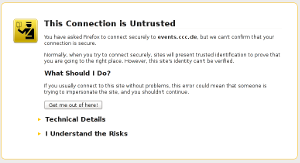 A number of people seem to be confused how to correctly install certificate chains for TLS servers. This happens quite often on HTTPS sites and to avoid having to explain things again and again I thought I'd write up something so I can refer to it. A few days ago flattr.com had a missing certificate chain (fixed now after I reported it) and various pages from the Chaos Computer Club have no certificate chain (not the main page, but several subdomains like events.ccc.de and frab.cccv.de). I've tried countless times to tell someone, but the problem persists. Maybe someone in charge will read this and fix it.
A number of people seem to be confused how to correctly install certificate chains for TLS servers. This happens quite often on HTTPS sites and to avoid having to explain things again and again I thought I'd write up something so I can refer to it. A few days ago flattr.com had a missing certificate chain (fixed now after I reported it) and various pages from the Chaos Computer Club have no certificate chain (not the main page, but several subdomains like events.ccc.de and frab.cccv.de). I've tried countless times to tell someone, but the problem persists. Maybe someone in charge will read this and fix it.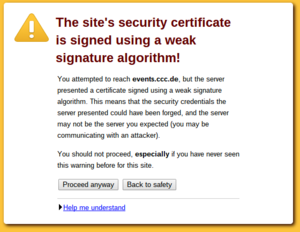
 Last weekend I was at the
Last weekend I was at the 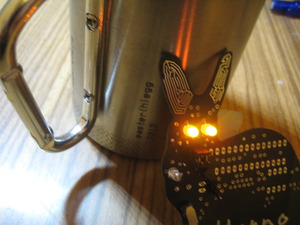
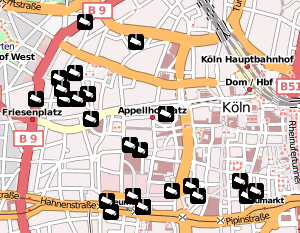 It's the second day on the
It's the second day on the 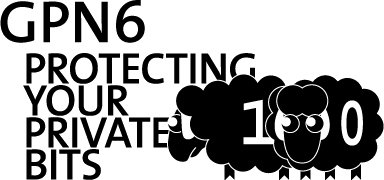
 Wie bereits angekündigt, treibe ich mich gerade auf den Metarheinmain Chaosdays in Wiesbaden rum. Location ist sehr ansprechend in einem Umfeld von grafittiverzierten, teilweise baufälligen Gebäuden und Kunstinstallationen (leider hat sich das Wetter gerade entschlossen, nicht sehr Foto-freundlich zu agieren und es sieht grad auch nicht so aus, als ob's heut nochmal Sonne gibt).
Wie bereits angekündigt, treibe ich mich gerade auf den Metarheinmain Chaosdays in Wiesbaden rum. Location ist sehr ansprechend in einem Umfeld von grafittiverzierten, teilweise baufälligen Gebäuden und Kunstinstallationen (leider hat sich das Wetter gerade entschlossen, nicht sehr Foto-freundlich zu agieren und es sieht grad auch nicht so aus, als ob's heut nochmal Sonne gibt).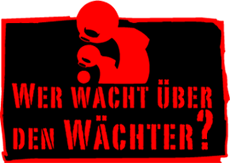 Kommendes Wochenende finden in Wiesbaden unter dem Motto »Wer wacht über den Wächter?« (ich hätte das ja nicht übersetzt) die
Kommendes Wochenende finden in Wiesbaden unter dem Motto »Wer wacht über den Wächter?« (ich hätte das ja nicht übersetzt) die